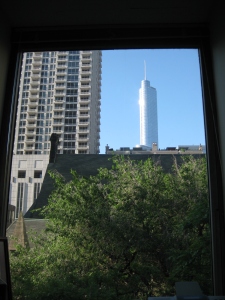One of the great things about internships is getting to actually use all of the stuff that you spent so much time learning about in school. I’m always reading about new or popular software, but no matter how cool some of it is, I might not have a pressing need to download it and try it out.
So far at ALCTS I’m averaging two new software applications each week, and getting to use them in a real, professional capacity. As I learn about some of these cool tools, I’ll share them with you here.
One that I started with my very first day is GoToWebinar.
In case you’re wondering, webinars are (as the name suggests) seminars or programs that are held over the Web. They can be small business meetings or huge presentations held for a thousand or so people. They can be simple, with one person presenting, or more complex, with mulitple users collaborating with multiple computers.
Webinars are particularly hot right now because they offer a tremendous opportunity for organizations to save money, and we all know how vital that is at this time.
The webinar software we use at ALCTS is GoToWebinar. I was first exposed to this company when helping Teach for America with a usability study for its new alumni website. For that we used GoToMeeting (slightly different features than the webinar version). The software allows for a simple and relatively cheap way to conduct user protocol studies. Since it allows presenters to screen share, the organizer can hand over control of her computer to the user and record everything the user says and does.
At ALCTS, we’re using GoToWebinar to conduct programs that are available for all of our members. It’s like attending a program at a conference, but you don’t have to ask your boss to pay for your hotel. Currently we are in the middle of a great series of presentations about institutional repositories. (Even if you missed the first two, they are all separate topics, and there are more in the works.)
What I like about GoToWebinar is it’s ease of use. Basic presentations are generally self-explanatory. On top of that, it has come cool advanced features that allow a presenter to feel more like he or she is speaking to an audience rather than an endless void. One option I particularly like is the ability to conduct polls that provide instant feedback, breaking down the results by percentage and allowing the presenter to share those results with their audience. Organizers are also able to tell who is watching the presentation and who is just checking their email/twitter feed. That’s a great one for teachers who require students to attend webinars for credit.
One thing I don’t like as much about GoToWebinar is the lack of features for the audience members. They can ask questions of the presenters, but they can’t chat with one another. One of the challanges of online communication is maintaining the best things about in person communication. At a real seminar, you get to talk not only to the presenters, but also to the other attendees, who might be people you run into just a few times a year. Other webinar software I’ve used, like WebEx, allow the attendees to chat (instant message throughout the presentation. In addition to letting attendees chat with one another, it allows attendees to provide spontaneous feedback to the presenter, which is vital. When you can’t see looks of confusion, you might not realize that your microphone is off.
Although I found the software fairly user-friendly, there are always users who prefer to read the manual. Unfortunately, the documentation for GoToWebinar is not that great. To help our presenters, I created a very basic tip sheet.
If your library or organization is looking to reach your patrons/members in a way that is convenient and inexpensive for both you and them, webinars are a great thing to try.

